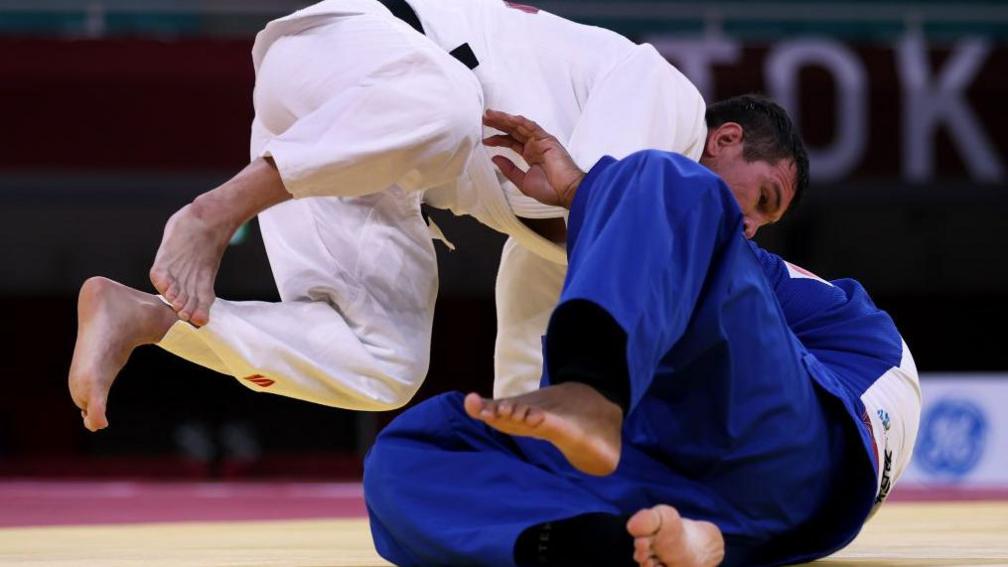Paralympics 2024: A guide to Para-judo at the Paris Games

Judo was first included in the Paralympic programme in Seoul in 1988
- Published
Key information
Dates: 5-7 September
Venue: Champ-de-Mars Arena
Gold medals on offer: 16
Paralympics judo classifications at Paris 2024
Judo at the Paralympics is only open to athletes with a visual impairment. The rules are the same as for Olympic judo, except that the fighters start the bout gripped up.
The sport's classification and weight divisions have been changed since Tokyo.
Now, there are two categories of visual impairment: J1 and J2 rather than fighters competing together.
In J1, athletes may have varying degrees of vision impairment, from some vision to fully blind. They wear a red circle to let others know that they may need guided support before, during and after a match. J2 athletes are partially sighted.
Both the J1 and J2 categories now have four weight categories for men and women - men's 60kg, -73kg, -90kg and +90kg and women's 48kg, -57kg, -70kg and +70kg rather than the seven men's and six women's divisions in Tokyo.
If an athlete has a yellow circle on their kit, it indicates that athlete is deaf as well as having a visual impairment.
Contests take place over four minutes, not including breaks.
Scores of varying degrees are awarded for throws, holding techniques or submissions with judokas bidding for an ippon to end the contest.
However, if neither achieves an ippon, the player who has accumulated the greatest number of points, achieved through throws and holds such as a yuko and a waza-ari, by the end of the bout is declared the winner. Two waza-ari also make an ippon.
Penalties (or shidos) are also given to the athletes for a range of reasons and can ultimately lead to victory and/or disqualification. Collecting four penalties can award victory to their opponent.
If both judoka are tied on scores or penalties at the end of their contest, it goes to a 'golden score', where the first person to score wins, with no time limit.
Which athletes will be competing for GB?
Chris Skelley claimed Britain's first judo gold at a Paralympics since 1996 when he triumphed in the -100kg event in Tokyo.
Following the sport's classification and weight changes he now competes in the J2+90kg category and the world number four will be hoping to come away with another Paralympic medal.
Like Skelley, Dan Powell is competing at his third Games while Evan Molloy will make his Paralympic debut.
Powell was inspired to take up the sport by his father Terry, a two-time Paralympic judo bronze medallist, and has won world and European silver medals in the J1-90kg event while Molloy goes in the J2 -90kg event.
Who are the other challengers?
Azerbaijan topped the medal table at the last Paralympics with eight medals, including six golds, but failed to land a title at either the 2022 Worlds on home soil or the 2023 Ibsa World Games.
China and Iran are traditionally strong along with Turkey. Brazil are also perennial challengers - Willians De Araujo has dominated the J1 +90kg division while Rosicleide De Andrade (J1 -48kg) and Brenda Souza De Freitas (J1 -70kg) could figure on the women's side.
And Ukraine, who managed a silver and four bronzes in Tokyo, will be hoping to win what would surely be an emotional gold - their best hope could be Anastasiia Harnyk in the J1 +70kg.
Did you know?
One of France's leading medal hopes in the sport is Helios Latchoumanaya who won bronze in the -90kg event in Tokyo and this time will be chasing success in the J2 -90kg competition.
Since Tokyo, Latchoumanaya has gone from strength to strength and won gold at the 2022 Worlds and the 2023 Ibsa World Games in Birmingham and is also European champion.
Like four-time Olympic champion Teddy Riner, he is of Guadeloupe descent, leading to comparisons between the pair, and he will be keen to match Riner's Paris 2024 achievement and land gold for the hosts.
ParalympicsGB Tokyo 2020 medals
One gold (Chris Skelley) and one silver (Elliot Stewart)